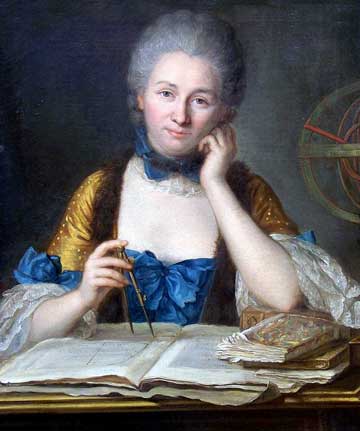Play
by Lauren Gunderson
Directed by Judy Braha
Scenic Design: Steven Royal
The Nora Theatre Company
Central Square Theater
Cambridge, MA
September 4 – October 5, 2014
With Lee Mikeska Gardner (Emilie), Steven Barkhimer (Voltaire), Sophorl Ngin (Soubrette), Lewis D. Wheeler (The Gentleman), Michelle Dowd (The Madame)

by Maurice Quentin de la Tour
She is indeed a bright woman, and like so many capable women, forced into a submissive role. Emilie is a wife and a mother, but earnest about the study of physics. Pursuing it, she comes into contact with Voltaire, with whom she forms a long-term alliance. Both stimulated and challenged by him, she finds the hope of intellectual opportunity at one turn and devastation at another.
This play begins with a certain amount of speculation about space and time, with the suggestion that the Emilie we see on stage is a kind of apparition who is visiting her past. There is, throughout the play, a lot of double-taking, with a second actress (Sophorl Ngin) playing the younger Emilie in past time while Emilie-in-the-present-sort-of is handled by the older and wiser persona (Lee Mikeksa Gardner). That suggestive approach is not consistently held throughout, with the older and wiser Emilie (Gardner) often holding long dialogues, in historic time, with Voltaire and other characters. Somehow, the uncanny implication is that when she touches or gets too close physically or emotionally to someone there is cosmic static and a need to shift to the younger character. I couldn’t quite figure out the justification for all of this though I got the general drift.
At times when the play gets interestingly historical, its virtues shine. When Emilie argues with Voltaire about the condemnatory critique he offers in response to her publication, there is real spark and static. At that point, the sense of Emilie and Voltaire as intellectual partners and as opponents comes through clearly. When Emilie argues with her daughter, who she has essentially neglected in order to pursue her own studies, the conflicts of independent intellectual pursuit and the demands of family come to the fore vividly; it’s a fine scene.
But the play meanders a lot in the nether realms of intellect, emotion and womanhood in a way that makes the potentially urgent message lose considerable force. So much time is spent by the playwright dithering about space and time, philosophy and love, present and past, that the real issue of respect for independent thinking by women gets blurred over.
There is also staging that tries to dramatize the issues but trivializes them. Every two minutes, Emilie goes to scratch a tally on the wall about whether she is making marks for love or philosophy. It is a ploy that works once or twice when first done, but by the twentieth time it wears quite old.
The play also is very long for what it accomplishes. Running about two hours and fifteen minutes with an intermission, it eventually gives a reasonable historical sense of Emilie’s life, but takes just too much time to do it. Leaving out a lot of the impressionistic dialogue and staging would have gone a long way towards economizing what sometimes feels like a plodding pace.

by Maurice Quentin de la Tour
When adorned with it, Steve Barkhimer looks a bit silly in his Voltaire wig, as I’m sure the production intends him to, and he gives an interpretation that is appropriately a combination of self-assurance, pretension, and self-absorption. Voltaire, here, is a largely a needy character and one is a bit hard-pressed to find in the role as written the towering intellectual of the era. But this play is really about his soft underbelly and we get insight into that at practically every turn. Certainly, at the end, when Emilie finds him dallying with particular inappropriateness, that soft underbelly gets thoroughly revealed.
In the central role, the artistic director of the Nora Theatre Company, Lee Mikeska Gardner, gives an animated performance, but it does sometimes feel like she’s breathing energetically into a leaky inner tube to keep it afloat. She tries hard to be both lusty and intellectually sparkling, giving it great effort with intermittent success, but there are not too many opportunities in the script to really let those moments shine.
The play seems so frequently self-conscious and determined to drive its points home that it loses the precious subtleties it might have nurtured. Emilie continues to announce the relevant points about science, love and womanhood so constantly that one wants her to get off the soapbox and just be herself.
Central Square Theater’s early summer offering, Cassandra Speaks, was a bright and potent solo performance about a woman of the mid-twentieth century wrestling with issues of independent professional integrity at the same time as she was suffering through complications of love. Married to novelist Sinclair Lewis for some time, the attraction to his personality and intellect drew her in, and the drama is wittily and effectively conceived to deliver its conflicts and resolutions cogently.
Though the subject matter of a strongly independent, but emotionally aware, woman in Emilie is similar to that in Cassandra Speaks, there is a much more intensely and self-consciously drawn dramatic structure Gunderson tries to impose, with less success. The issue of a woman challenged by the mores of the 18th century is put forward and well-taken as an outline of this story, but its dramatic scheme is too disparate to make its form live up to the demands of its subject-matter.
The set, designed by Steven Royal, is dramatic and commanding, a swirl of enveloping orbits that gives a lovely combined sense of the protagonist’s scientific life and the gyrations of time that the play suggests.
– BADMan
Leave a Reply